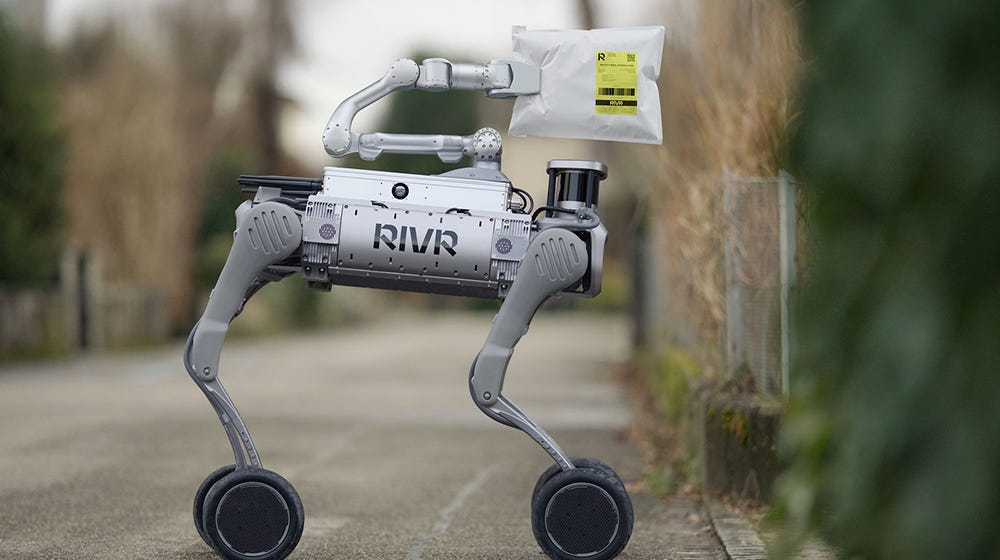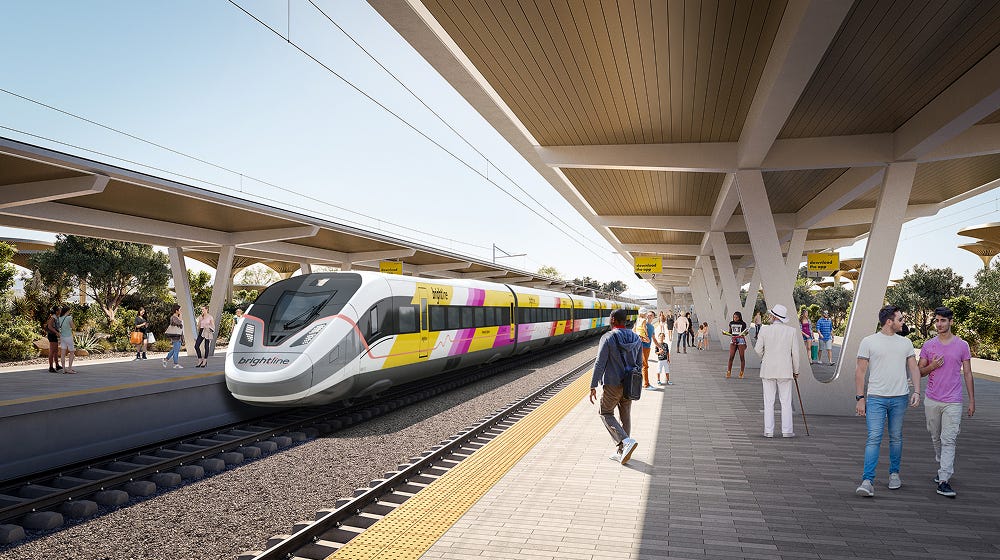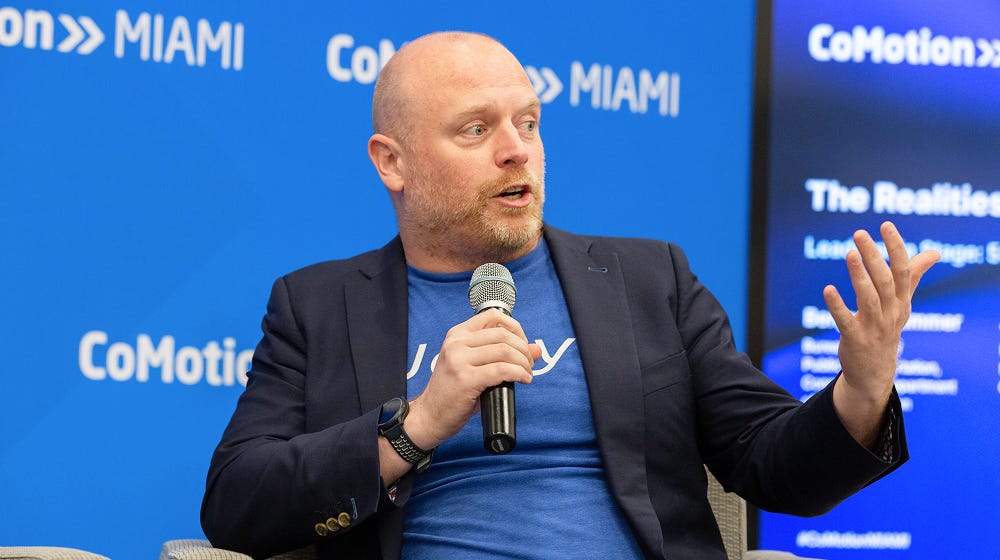Welcome to CoMotion NEWS, your weekly roundup of news and analysis of the mobility revolution. If this email was forwarded, you can sign up here for NEWS.
We kick off this week with two mysterious stories in Austin: Tesla prepares to launch a fleet of robotaxis about which the public still knows almost nothing and a robot that climbs stairs like a dog is redefining the last few feet of parcel delivery. In the skies, Archer and Joby are racing toward commercial air taxi service—with help from investors in the UAE, Saudi Arabia and Toyota.
In India, battery swapping is gaining traction, and in London, Volteras is building a virtual power plant from parked EVs. At the same time, a lawsuit against Uber could rattle the very foundation of ride-hailing, and Illinois is pushing bold policies to rescue Chicago transit from a fiscal cliff. Meanwhile, Volkswagen’s Dieselgate finally lands executives behind bars, even as China’s Sinopec places a $690 million bet that hydrogen will power what’s next.
What you need to know
The Tesla robotaxi launch nears: Tesla is reportedly targeting June 12 as the launch date for its initial fleet of robotaxis in Austin, but details about how the service will work remain remarkably sparse.
Uber hit with patent lawsuit: Carma Technology, a rideshare pioneer that later shifted into more niche transportation tech domains, accuses Uber of infringing on patents it received in 2007 related to matching riders with vehicles. The company has requested a jury trial and is demanding damages for lost business and a share of Uber’s future earnings. Why did it take Carma so long to sue? They say they needed to make enough money to afford the cost of taking on such a large company in court. Suffice it to say, the implications of a ruling against Uber would be massive, not just for Uber but the entire ride-sharing industry.

Working like a (robot) dog: Veho, a New York-based logistics company, is collaborating with Swiss robotics startup Rivr to pilot a stair-climbing, four-wheeled delivery robot in Austin. The bot, described as "a dog on roller skates," aims to tackle the challenging "last 100 yards" of parcel delivery from van to doorstep. Veho envisions that such robots could eventually work alongside human drivers. The robots, who always remember to lift from their legs, would presumably suffer far fewer back injuries.
The dieselgate verdict: Four former Volkswagen executives are convicted of fraud in a German court for their roles in the "dieselgate" emissions scandal, with sentences ranging from suspended terms to four and a half years in prison. The scandal, which erupted ten years ago, led to a steep decline in diesel vehicles, which formerly accounted for over half of Europe's auto sales, and accelerated the adoption of EVs, with Volkswagen emerging as the continent's leading EV manufacturer.
Archer aims for commercial launch in UAE: Air taxi company Archer Aviation hopes to launch commercial flights in the United Arab Emirates this year. While UAE regulators often take their cues from the Federal Aviation Administration in the U.S., they have signaled that they may allow Archer to take flight before it receives final FAA certification.
A big week for Joby: Joby Aviation, the California-based eVTOL manufacturer, secures a $250 million investment from Toyota, marking the first half of a previously announced $500 million funding agreement to support the development of its air taxis. The same week, the company inked a deal with Saudi conglomerate Abdul Latif Jameel, one of its investors, to distribute up to 200 of its eVTOL vehicles valued at about $1 billion.
Illinois scrambles to save Chicago transit: Illinois lawmakers are considering a variety of funding sources to stave off devastating cuts to Chicago’s public transit system, including increased highway tolls and new taxes on real estate transactions, Uber and Lyft rides and EV charging. Perhaps most crucially, it would permanently reduce the “farebox recovery” ratio for Chicagoland transit agencies from 50% to 25%.
Chinese oil giant launches hydrogen fund: China's state-owned oil giant Sinopec establishes a $690 million venture capital fund to invest in early-stage technologies, materials, and equipment across the hydrogen value chain. The fund is part of Sinopec's broader strategy, which includes stakes in 13 hydrogen-related companies and the development of 11 hydrogen supply centers and 144 refueling stations nationwide.
DoorDash becomes a giant: In the past month the food delivery app made two major acquisitions, including a $3.9 billion purchase of rival Deliveroo. It’s the latest chapter in CEO Tony Xu’s effort to dominate the food delivery market. The app he founded 12 years ago is now valued at almost $90 billion.
Big bucks for battery swapping in India: BatterySmart, a battery-swapping operator based in Gurugram, India, raises $29 million in a Series B round led by private equity firm Rising Tide Energy. The company already operates more than 1,500 battery-swapping stations in Dehli, serving India’s burgeoning market of electric two and three-wheel vehicles. The company plans to expand its network to more Indian cities.
Volteras’ vision for virtual power plants: Volteras, a London startup developing software to turn EVs into virtual power plants, raises $11.1 million in a Series A round. Voltera is one of a number of companies that aims to transform EVs from a threat to the electric grid to a major asset for electric reliability, enabling utilities to tap into their stored energy and pay owners for it.
What we’re reading
LA could be the world’s best biking city: Dave Snyder, author of the Movement Newsletter, writes that LA has the foundation of a good bike city: great weather, flat terrain, population density and, at least by American standards, a decent public transit system. CoMotion’s own Daniel Eppstein chimes in, noting that it’s often faster to get around by e-bike in LA than by car. But there’s still much work to do …
How Norway conquered range anxiety: The Washington Post looks at how Norway transformed its auto maker into nearly 100% EVs in a few short years, even in rural areas where “range anxiety” is most acute. Long story short: the government took bold action, both to make EVs affordable and EV chargers widely accessible.

America as a high speed rail model? It’s not often that America is held up as a shining example of rail progress, but critics of a $30 billion high-speed rail project connecting Sydney to Newcastle say a private rail line being built by Brightline between Los Angeles and Las Vegas offers some important lessons on cost efficiency.
CoMotion's mobility goodness brought to you by:
Jack Craver,
Editor, CoMotion NEWS
jcraver@comotionglobal.com
Write to us if you would like to suggest content for our next newsletter!
Partner with us
Our events CoMotion LA, CoMotion MIAMI, and the Monaco Hydrogen Forum represent a unique opportunity to build global awareness in the industry. Build influence, elevate your brand, and connect with ground-breaking companies and public sector leaders.
“It's really exciting to be at this year's CoMotion, with the best, most creative, and innovative minds together thinking about solutions on how we advance transportation.” - Laura Rubio Cornejo, General Manager, LADOT
Email us if you are interested in learning more.
YouTube | LinkedIn | Podcast | X

